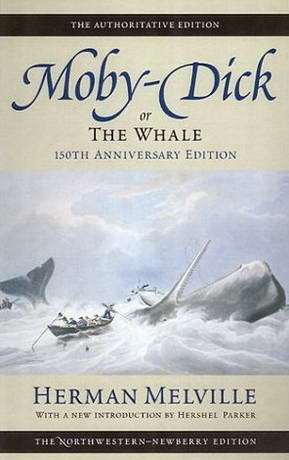 Moby Dick by Herman Melville was not what I expected. Perhaps I ran into a case where I am so familiar with the climax, the focus of the tale, that at every turn of the page I expected a siting of the White Whale and a Moby Dick. vs. Ahab fight to the death. It took over four-fifths of the book for the whaling vessel Pequod to even see the whale. So, if the book is not about a fight between a whale and a man, what is it about?
Moby Dick by Herman Melville was not what I expected. Perhaps I ran into a case where I am so familiar with the climax, the focus of the tale, that at every turn of the page I expected a siting of the White Whale and a Moby Dick. vs. Ahab fight to the death. It took over four-fifths of the book for the whaling vessel Pequod to even see the whale. So, if the book is not about a fight between a whale and a man, what is it about?This is the point, early on, that things begin to fall apart for me. This book is so thick with meaning, layering and heft, and I was unable to devote the time and intensity necessary to understand even half of it. Where's Mrs. Jackson, my high school English teacher, when you need her? But I will try to piece together what little I did get about and from the story.
In a way, the two main character, Ahab (the captain) and Ishmael (the narrator and crew member) counter balance one another elegantly. Ahab seeks Moby Dick in order to conquer it, to know it in its death. Ishmael, on the other hand, seems to want an adventure and to know the ins and outs of whales in general. Many chapters are devoted to Ishmael discussing types of whales, bones of whales, intellect of whales, whales in literature, whales in art, uses of whale parts, the benevolence or malevolence of different whales. One man desires to know one whale to its soul. Another to know all whales' in their parts, possibly in hopes of explaining to himself, and thus the reader, Ahab's passionate pursuit of Moby Dick.
In addition to this ongoing discussion of knowledge and knowing, Melville incorporates a discussion of fate and prophesy throughout the book. This one was harder for me to track since it did not typically consist of a chapter-long aside, as did Ishmael's discussion on whales. From seemingly insane men prophesying doom to the very name of the ship, Pequod, a Native American tribe that did not last long after white men arrived, this permeating sense of doom weaves its tendrils throughout the book. The reader senses the tragic outcome before many of the characters do.
As for how Moby Dick relates and interacts with American culture, I posit that this is the quintessential tale of man versus nature as well as single-minded pursuit. To extrapolate to our culture, this theme touches on conquering the unconquerable and ambitiously pursuing a goal at all costs, things that define what has come to be the American stereotype. That relentless pursuit sometimes yields great progress and light, and sometimes it yields a person's own White Whale. If one were ask the average American for literary examples of these ideals, most would not name Moby Dick, but it is there in the background, just under the surface below visibility.
Great American Novel Challenge Booklist:
July 2009: Absalom, Absalom! - William Faulkner, publ. 1936
August 2009: Lonesome Dove - Larry McMurtry, publ. 1985
5 comments:
You posted this while I was out of town and I never had a chance to sit and read it - today I got your comment about the Zookeeper's Wife and it reminded me to come look at your post!
I have never read Moby Dick either and to be perfectly honest, I don't think I ever wanted to...I don't know if I relate well to man vs nature.
I'm a totally enjoying reading all the posts from the GANC!
I hope you're doing well!
I had a professor walk into class, lift his tattered copy of Moby-Dick over his head, and pronounce: "This book is more complicated than life itself!" I've read it 5 times now and I still sometimes think "what?!?"
I think your professor was on to something with that pronouncement. It amazes me how simple the book is at times, only to then look back on that chapter or interplay pages later and think, "Wow, that is so complex what I thought was plain as day."
Moby Dick humor. :-)
Man, I wonder where that elusive copy of Hemingway's book is. I am not sure if fart jokes or space monkeys would better explain the story or make it even more confusing. I guess we may never know.
Post a Comment